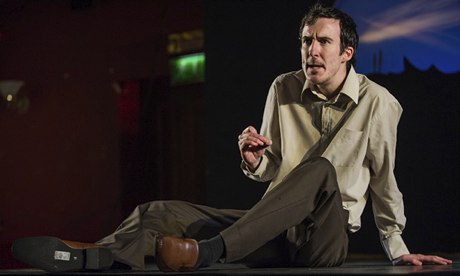
An award-winning Belfast playwright and TV dramatist has confronted the issue of rising suicide rates in Northern Ireland's post-ceasefire, peace-process era, after the number of his friends and neighbours who have taken their own lives reached 30.
And for Pearse Elliott, whose television screenplays and stage dramas capture working-class life in republican west Belfast, it is the "absence of war" that has been responsible partly for a huge spike in suicides since the Troubles ended.
Elliott's new play, Man in the Moon, focuses on the devastation suicide wreaks on one family, particularly on one son whose two brothers have taken their own lives.
The one-man show has run at Belfast's Grand Opera House before touring across Northern Ireland.
"It is based on a true story, on a family I actually knew, where two out of the three boys took their own lives" Elliott says. "The play is a one-man performance about the surviving boy, sitting on a park bench trying to work out what has happened to him and his family."
The survivor is played by Ciaran Nolan, a long-term friend of Elliott's and actor who has just starred in Channel 4's new drama London Irish about young exiles living and working in the UK's capital.
"I was very close to this story because these lads in real life were friends," Elliott explains.
"It was time to write about this because generally speaking men in particular do not talk about this massive social problem. From where I am in west Belfast I can think of at least 30 people – friends, neighbours – who have taken their own lives over the last decade."
The play premiered in a west Belfast social club in front of an audience that included men who had lost friends and relations in recent years.
"When it opened in the club I had one guy come up to me afterwards and remind me about a mutual friend called Gabe who had taken his own life not long ago. The only thing this guy could bring himself to say to me was: 'I just wish he was here.' At that moment I could see that the taboo was breaking, that local men were finally talking openly about what was happening," Elliott recalls.
The 42-year old writer who has tackled subjects including drugs and the lives of petty criminals in what was once a cockpit of the Troubles, says he believes the end of the conflict played a large part in the rise in suicide rates.
"Once upon a time this community had a common enemy, the forces of the state. There was a common cause and a common bond. Nowadays people are disenfranchised and alienated in the absence of war. I'm not saying for one moment they were the good old days, they weren't. But there has been an erosion of community and family values, people more out for themselves, people are more alone," he says.
Then Elliott points to new graffiti on the walls of west Belfast that reflects the changing times.
"On a wall near me where they used to put up political slogans or paint 'Up the IRA', I recently saw graffiti that simply said 'We kill dogs'. The nihilism of that kind of summed it all up."
The play's producer Tony Devlin stresses that its message has universal appeal. "We are taking it on a tour all over the north of Ireland, but I really think the themes contained in the play would be understood if we staged it in the north-east of England or the big cities of Scotland. The issues of men, teenagers up to those in their middle age, coping with the loss of friends to suicide, the loss of their own identities, the pressures from life they way it is now, all of that could be understood especially in places where ordinary people have lost out," Devlin adds.
The play puts a human face on figures that show alarming increases in suicide since the ceasefires and the Good Friday agreement in Easter 1998.
A Queen's University of Belfast survey last year found that survivors of the worst years of the Troubles in Northern Ireland are more prone to suicide and are using antidepressants to cope with living in an era of peace.
Suicide rates have nearly doubled for middle-aged men – who lived through the darkest days of the violence – in the decade of peace from the 1998 Good Friday agreement, the research found. The number of men who took their own lives went from 13 per 100,000 of the population in 1997 to 24 per 100,000 by 2008.
In another survey by Northern Ireland's Public Health Agency (PHA), it was noted that after a period of relatively static figures in the latter half of the last century, between 1999 and 2008 rates of suicide in Northern Ireland increased by 64%. Most of the rise was attributable to young men in the 15 to 34 age group.

